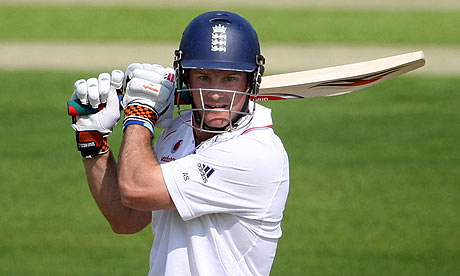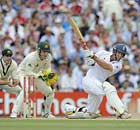The time may be right for Andrew Strauss. Remember all the agonising at the end of the 2006 season about who should lead England to Australia, Andrew Flintoff or Strauss. We know who was chosen and with hindsight most of us agree that they picked the wrong man – though it was not so obvious at the time.
Now, perhaps, England might benefit from that decision. Disastrous Ashes tours usually end in the demise of an England captain. Strauss, of course, shrugs off such a hypothetical suggestion. He seems capable of shrugging off just about anything. He comes over as the most phlegmatic England captain in living memory. I hear a case for Gower but he could – occasionally – flip quite spectacularly. It is hard to imagine Strauss doing the same.
Looking back at that decision in 2006 Strauss simply says, "In 2006 Fred [Flintoff] was next in line; he deserved his chance." He adds with a wry smile: "I'd have struggled to win that series."
No one doubts that he is the best man for the job now. The ECB had their dalliance with Kevin Pietersen and then seemed surprised that he was a bit of a wild card. The subsequent cleansing of the stables enabled England – by the back door – to get the right men in charge. Now Strauss and Andy Flower, eminently capable and compatible, face their ultimate challenge.
On the last weekend of the inevitable phoney war England have to finalise their squad, which is to be announced today. The only source of serious debate must have centred upon which fast bowlers should join the triumvirate that was at Edgbaston last week, one or two from Ryan Sidebottom, Steve Harmison and Graham Onions.
Talking at Edgbaston, Strauss articulated how important this series is to any England cricketer. He speaks clearly, with surprising volume for such a self-effacing character, who seems utterly devoid of ego.
"Every time I think about leading out the England side at the start of an Ashes series there is a tingle of excitement and the closer it gets the more exciting it becomes. I can't wait until Wednesday morning and the rest of the players take a similar view. The bigger the build-up the more you want to play.
"It's a massive honour to lead the side in the Ashes. As an England player it is what you are remembered for." He is right. How do you recall Mike Gatting? As the man who led England to an Ashes victory in 1986-87 or the one who could manage just two Test victories in his 23 Tests in charge? The former, I suggest.
All the Anglo-centric talk has been about 2005, while the more recent series in Australia has barely warranted a mention. "It's unhelpful to look back too much to 2005," says Strauss. "This is going to be a very different series and it would be wrong to expect things to go in a similar manner. What I take from 2005 is how close those games were and how hard it was to finish them off. There were times we were right on top and maybe we didn't have enough belief to do that. One of the things we have been trying to work on is to be very clinical so that when we get on top of teams we finish them off once and for all. That's going to be important in the coming days."
Strauss had what he described as "a frank, honest and informative chat" with Michael Vaughan after he had announced his retirement. He will not slavishly imitate the style of the former England captain but he says: "There are certain fundamentals that Vaughan brought in that I try to follow. I try not to put the players under too much pressure, taking it off them is important. That sense of going out and trying to express yourself is vital.
"One of the things that is fundamental to my captaincy and that I have talked a lot about is player responsibility and not encouraging them but making them make decisions for themselves. Vaughan did that and so did Duncan Fletcher. When the England team were playing well under him the environment was the best I have experienced in any cricket."
So Strauss recognises that it is crucial to recapture the mood of 2005. "There's no doubt that if you want to play well against Australia you have got to take them on and be prepared to scrap. Anybody who goes in there and just thinks 'Oh no, we'll just stick to our own game' is going to come unstuck. Our players are absolutely certain that they will go out there and go blow for blow.
"I like where we're at. I thought there were some really encouraging signs against the West Indies, there was good, controlled aggression and we were clinical. We're not going to know for certain until we go out there against the Australians, but the signs are good, and I like the characters we have got in the side. I don't see any that are going to be open to exploitation and that's vital.
"There are going to be key areas everywhere. The opening batting is going to be important and a lot will depend upon how you handle the pressure."
Strauss expresses confidence about the Essex youngsters at the top of his order. "They've shown they have what it takes so far in their careers, Ravi right at the start during the World Cup. More recently he came in at number three and there was a lot of pressure surrounding him then. He reacted to that very well. Nobody knows for certain how people are going to react in that sort of cauldron, but the signs are there." Alastair Cook, though only 24, is something of a veteran after 43 Tests and one Ashes series. He will continue as Strauss's vice-captain.
Strauss is eager that his side will not be overly dependent upon Flintoff and Kevin Pietersen. "You don't win Ashes series unless all 11 play a big part", he says. But he needs two of his former captains to fire. "If Fred bowls with aggression no player in the world is going to enjoy that. I still think there are some scars in their side. Maybe some of their batsman haven't faced him very much before but they will have watched that series four years ago and know that when he's good he's very, very good."
As for Pietersen, Strauss was unconcerned by his two failures in the warm-up match at Edgbaston. "KP hasn't changed his style of batting in four years. I don't expect him to this time. KP is a man for the big occasion. I wasn't overly surprised he didn't get many runs in the Warwickshire game, but come that first Test match you know that's he's going to be switched on and keen to make his mark on the series right from ball one. He backs himself against any bowler, he backed himself against Warne and McGrath and he will do that against these bowlers. His number-one asset is his confidence".
Of course there is no Shane Warne or Glenn McGrath this time around and Strauss is more than happy to focus on the diminished nature of the Australian side. "It's not just Warne and McGrath," says Strauss. "You can add Gilchrist, Hayden and Langer into the mix as well. When you look at the Australians of two years ago and even four years ago there were some of the legends of the game, certainly of our generation and probably in Warne and McGrath's case, of all time. It's a huge loss for any side to take, but the Australian system is always a good one. At the moment their replacements don't have that aura about them."
Like the rest of us who have been contemplating this series for a while he will be relieved when it gets under way and instead of all the hype, something happens. "That first morning is a time for us to be calm and play our cricket, not get carried away with what's going on, although that's easier said than done. The one key is consistency. Over five Test matches and 25 days of cricket you can't have too many bad days. It's as simple as that; so if you have a great day you can't pat yourselves on the back too much, if you have a bad day you've got to bounce straight back. In a five-Test series the best side wins." Well, none of us, from Ricky Ponting to Merv Hughes to Kevin Rudd to Dame Edna can argue with that. Let's get it started.











